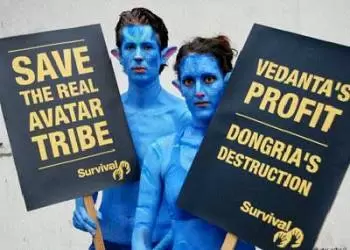Media too has joined the industrialists, bureaucrats and politicians in flaying eco-activism

17-November-2012
Vol 3 | Issue 46
By any reckoning, the diatribes against the environment ministry from the mainstream media -- even more than politicians, bureaucracy or captains of industry -- have caught environmental journalists off guard.
The India Today cover story titled ‘Green Terror’, on October 15, made no pretence of maintaining a balance: it did not quote a single source in favour of retaining environmental regulations for clearing major projects.
 |
|
Environmental journalists are facing the heat now as corporates turn their ire on eco-activism (Photo: Infochange News & Features)
|
The spirited opposition of Environment Minister Jayanti Natarajan and Forest Minister K C Deo to the prime minister’s proposal to fast-track such projects worth over Rs 1,000 crore with a National Investment Board (NIB) has also caught green scribes on the wrong foot.
We firmly opposed the replacement of former Environment Minister Jairam Ramesh, with his swashbuckling style -- or, in the far too personal phrase of the India Today cover story, “he of the heavy hair and the light wit”.
His successor, a former Congress spokesperson, however feisty, was someone who had not even a nodding acquaintance with ecological issues. This sent a strong signal to the industry lobby that obstacles were being removed to boost economic growth, which has been floundering for so many months. In other words, UPA2 meant business.
A second attack by the media emanated from Sunday Indian Express columnist Tavleen Singh who, with her characteristic acerbity, called for nothing less than the demise of the offending Paryavaran Bhavan in her October 14 piece titled ‘A Ministry That Needs to Die’.
She railed against “environmental NGOs who are mostly frauds. In an excellent cover story last week, India Today drew attention to the Adani group’s port in Mundra (Gujarat) being stopped by an ‘expert committee’ that recommended closure because it violated the coastal regulation zone”. Where else could ports be built, she wondered sarcastically.
Somewhat unusually, due to an unwritten convention that dog doesn’t eat dog (I won’t use the female equivalent), she also decimated green scribes. She needs to be quoted in toto: “It would be wrong if I did not add that environmental journalists are nearly (thank god for small mercies!) as big frauds as the NGOs.
When the environment became a glamorous, fashionable subject there suddenly appeared in the media a profusion of two-bit hacks who became ‘experts’ on the subject. It was a good career move because there was little competition and great opportunities for free travel to international conferences, often with generous help from the environment ministry.”
As a card-carrying member of this tribe, I can’t let this go without a stout defence. Some NGOs, whose offices this scribe has visited, have had no hesitation in what the British term “taking their Mickey” or owning up to some peccadilloes. Here is an abbreviated version of a verse titled ‘The Development Set’ by Ross Coggins, which these NGOs have prominently displayed on their notice boards, in what communists would call abject “self-criticism”:
Excuse me, friends, I must catch my jet
I’m off to join the Development Set;
My bags are packed, and I’ve had all my shots
I have traveller’s checks and pills for the trots!
The Development Set is bright and noble
Our thoughts are deep and our vision global;
Although we move with the better classes
Our thoughts are always with the masses.
In Sheraton Hotels in scattered nations
We damn multinational corporations;
Injustice seems easy to protest
In such seething hotbeds of social rest.
We discuss malnutrition over steaks
And plan hunger talks during coffee breaks.
Whether Asian floods or African drought,
We face each issue with open mouth…
Eye-level photographs subtly assure
That your host is at home with the great and the poor.
Enough of these verses -- on with the mission!
Our task is as broad as the human condition!
Just pray god the biblical promise is true:
The poor ye shall always have with you.
-- Adult Education and Development, September 1976
I do admire Ms Singh’s prose though I generally disagree with every word she has written, especially her diatribes against officialdom and her blatant defence of those investors who are building huge infrastructure projects.
On a more personal note, I can recall an Express column where she took on the Mumbai Municipal Corporation official who had the temerity to haul her up for permitting her pet to defecate on the Marine Drive promenade.
Brimming with righteous indignation, she asked what right the official had to single her dog out when it was so well brought up; why wasn’t the corporation taking any action against the dirty strays which were fouling the pavement? We aren’t aware whether the columnist had to fork out Rs 1,200 as the fine for such an offence, or the official was simply cowed down by the elitist arrogance of her class.
A third instance of the media taking sides without a semblance of fair play was a weekly TV talk show We Mean Business on the topic ‘Is the Opposition to National Investment Board Justified?’ on October 15 on NDTV Profit, in which this Eco-Logic columnist was a panellist.
The irony was that even though the industry and business panellists all acknowledged the importance of protecting the environment -- one said that he didn’t want his children to live in a world where the ecology was ruined -- Shweta Rajpal Kohli, the editor-economic affairs, had no qualms about repeatedly provoking them to protest against the letter that Ms Natarajan wrote to the PM, defending her turf.
I feared that in spite of the presence of Dr Prodipto Ghosh, former environment secretary and now a distinguished fellow at The Energy & Resources Institute (TERI), I would be in a minority of one on the programme.
This, because India Today had quoted him as saying: “Unfortunately, what has happened is that a few environmental lawyers and activists have decided to challenge every clearance granted by the ministry. The National Green Tribunal (NGT) has been giving stay orders without going into the merits and proper consideration.
“To my mind, NGT really has to be transformed from a judicial body to an appellate regulatory body. The three kinds of clearances have to be taken out of its jurisdiction and placed under an appellate environmental body, which will follow the guidelines of the government.” Whether he was quoted out of context or selectively is difficult to say.
In the TV show, however, Dr Ghosh stuck to his guns and argued that if the proposed National Investment Board did away with procedures such as submitting a detailed environmental impact assessment (EIA) or holding public hearings for affected people before the project was sanctioned, it would only invite an array of public interest litigations and other forms of scrutiny and opposition. This was evident, he pointed out, in the protracted rallies against the Koodankulam nuclear power plant on the Tamil Nadu coast.
The well-known moderator, however, would not be restrained and at one stage even referred to the “Green Terror” in so many words, albeit as a question regarding its existence.
An activist later wrote to this columnist, pointing out that she had obviously already made up her mind and was all set to take on the environment ministry for proving a stumbling block in that search for the Golden Fleece -- the elusive 8% growth rate. Even for a business news channel, such displays of prejudice on the part of talk show hosts are shocking, to say the least.
Perhaps it is wrong to fault the media solely, because the political and business classes have not minced their words either. As India Today reported, the prime minister himself said in July at a seminar in the capital that a proposed National Environment Appraisal and Monitoring Authority (later referred to as the NIB) would revamp the process of granting environmental clearance and remove “the hated licence permit raj”.
In September, Planning Commission Deputy Chairman Montek Singh Ahluwalia admitted that “the method of clearances of environment and forestry is arbitrary, non-scientific and non-transparent”. With heavy sarcasm, India Today comments, for good measure: “The green curtain did not even flutter.”
Adi Godrej, president of the Confederation of Indian Industry (CII), said: “Anything that takes months on end to be cleared is too much. We must learn to clear things very, very rapidly. And by rapidly I mean in a matter of weeks, not months or years… The trouble these days is that there is a lot of delay in environmental approvals by not just the environment ministry, but also at the state level.”
FICCI Secretary-General Rajiv Kumar said that there was only “one workable solution. Do away with the licence raj system of clearances and instead punish corporates for violations of the law, should that happen".
India Today adds, helpfully: “He says it’s like getting a driving licence: once you get it, you don’t have to get clearance every year. There are a set of traffic laws which are given to you when you get the licence. If you violate any of the laws, you will be punished. Environment laws should be applied similarly.”
India Today is making no bones about where it stands: it quotes none other than Mukesh Kumar, chief operating officer of Vedanta Aluminium: “If the environmental impact assessment division has recommended that a project be given clearance, then who is the minister to decide otherwise?”
For a company whose head office is in London and has attracted worldwide condemnation for trying to build a bauxite refinery in a remote adivasi tract of Orissa, driving the minuscule Dongria Kondh tribals to the verge of extinction, this is rather rich. Jairam Ramesh -- India Today refers to the Paryavaran Bhavan duo as the “J factor”! -- halted the project in its tracks and industrialist Anil Agarwal officially declared it closed last month.
While the Indian media, both print and electronic, can certainly be accused of looking to their circulation or TRPs, as the case may be, and are far too soft on industry, as this month’s New Yorker in its cover story ‘Citizens Jain’ (http://nyr.kr/TOl24l) makes amply clear, the failure to apply the most basic tenet of journalism -- of presenting both sides of a story -- has been given short shrift.
With the convergence of the mainstream media, as the ownership of print, electronic and web outlets becomes concentrated in fewer and fewer hands, particularly those of the most powerful business houses, the tendency to discredit the environmental movement may only grow, since the latter is reflexively anti-industry.
This has indeed been the case with the world’s biggest media mogul, Rupert Murdoch. His British newspapers -- from the raunchy tabloid Sun to the formerly staid Times, not to mention his obnoxious Fox news channel -- have repeatedly sought to establish that the globe is not warming. Green scribes therefore have to remember that eternal vigilance is the price of liberty. - Infochange News & Features














